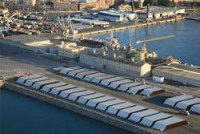Europe replaces Gazprom with Algeria
 In March, Algeria will export gas to Europe via Medgaz pipeline laid beneath the Mediterranean Sea. The EU continues to reduce its dependence on Russian gas, and Algeria continues to strengthen its position as a natural gas distributor in Europe. At the moment this country is the third largest supplier to the EU.
In March, Algeria will export gas to Europe via Medgaz pipeline laid beneath the Mediterranean Sea. The EU continues to reduce its dependence on Russian gas, and Algeria continues to strengthen its position as a natural gas distributor in Europe. At the moment this country is the third largest supplier to the EU.
The construction of the pipeline started in March of 2008. The pipe from the field Hussey Rmel is laid to the Algerian port of Beni Saf (574 km), where it goes under water. Then it stretches for another 210 km beneath the Mediterranean Sea in the direction of Spain. The capacity of the pipeline is 8 billion cubic meters of gas per year.
The Medgaz consortium that was involved in the construction of the gas pipeline includes the Algerian Sonatrach - 36%, Spanish CEPSA - 20%, Iberdrola - 20% and Endesa - 12% and Gaz de France - 12%.
Interestingly enough, the construction of the underwater part of the line was conducted by the Italian company Saipem, that earlier has lost a tender for construction of the Russian Nord Stream in the Baltic Sea.
630 million euros was spent on the construction of the underwater area. The entire project is worth over 1 billion euros, against the planned 900 million. However, the EU is willing to pay for supply diversification. Three gas pipelines have already been laid from Algeria to the European continent. These are TransMed pipeline leading to Italy, the Maghreb-Europe pipeline and Medgaz carrying supplies to Spain.
Algeria came in second in the world in terms of export of liquefied gas. This North African country is one of the largest suppliers of gas to the EU. It accounts for 20% of the EU gas.
It is expected that by 2013-2014 gas exports from the country to Europe should amount to approximately 85 billion cubic meters. At the moment, Algeria officially exports 62 billion cubic meters of gas to the EU.
However, the instability in the Maghreb countries could disrupt the supplies in the strategically important for the EU gas pipelines. In particular, TransMed line passes through the territory of Tunisia that has barely recovered from the riots.
In addition, there may be problems with the operation of Greenstream pipeline which supplies gas to Europe from the troubled Libya.
Nevertheless, the diversification of gas supply and marketing of large volumes of liquefied natural gas allows counteragents of Gazprom to intensify the pressure to reduce the contract price for the Russian natural gas.
However, the EU's dependence on gas supplies from North Africa in the case of increasing chaos in the provider and transit countries can improve Gazprom's position in Europe and make South Stream project more popular.
The uncertainty in the Arab East will bolster oil prices. On the world market the price of crude Brent oil exceeds $100 per barrel. This means that gas prices tied to oil quotations will soon crawl up and the Russian gas monopoly will be able to win back its price positions lost earlier.
However, in strategic terms the position of Gazprom in the EU and the price of gas will largely depend on the interaction between the major gas suppliers to Europe.
Boris Yaremenko
Bigness
Subscribe to Pravda.Ru Telegram channel, Facebook, RSS!




